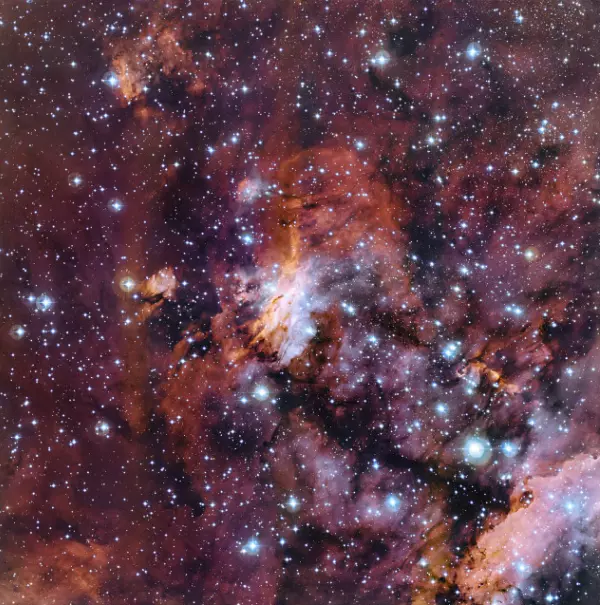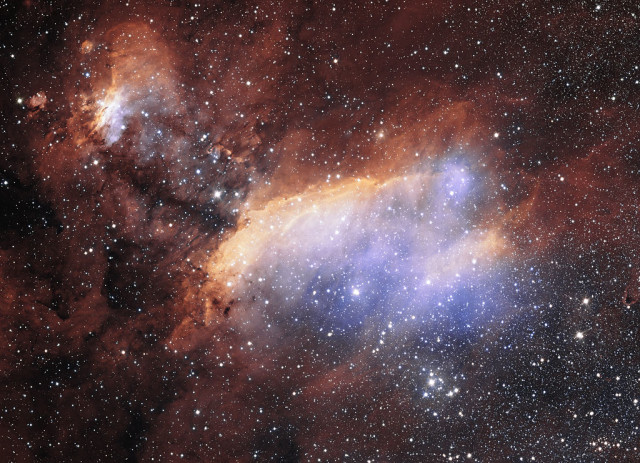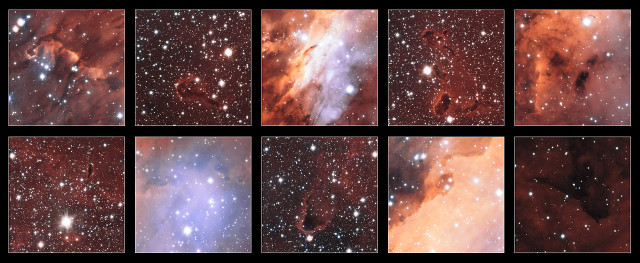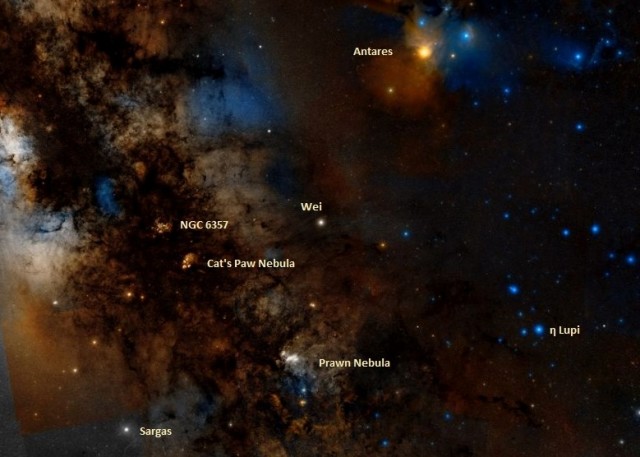The Prawn Nebula, also known as IC 4628 and Gum 56, is an emission nebula located in the constellation Scorpius. It has an apparent magnitude of 7.31 and lies at a distance of 6,000 light years from Earth. Located to the south of Antares, the nebula is about 250 light years in diameter, corresponding to an apparent size of 1.5 degrees, or 3-4 times the size of the full Moon.
The Prawn Nebula was discovered by the American astronomer Edward Emerson Barnard around 1900. It is a stellar nursery that contains a large number of very hot, luminous, young stars, formed out of the surrounding gas. These stars include two large, hot, blue-white giants belonging to the rare spectral class O. O-type stars have a relatively short life span as they tend to burn out very quickly before ending their lives as supernovae and collapsing into either neutron stars or black holes. The blue giants in IC 4628 will end their lives after only about a million years. The material produced by the supernova events will be used to form new stars in the nebula.

The rich patchwork of gas clouds in this new image make up part of a huge stellar nursery nicknamed the Prawn Nebula (also known as Gum 56 and IC 4628). Taken using the MPG/ESO 2.2-metre telescope at the La Silla Observatory in Chile, this may well be one of the best pictures ever taken of this object. It shows clumps of hot new-born stars nestled in among the clouds that make up the nebula. Image: ESO
The two luminous giants and other young stars in the nebula are responsible for illuminating the surrounding gas. The stars emit an enormous amount of ultraviolet radiation which ionises the hydrogen gas in the nebula, making it glow.
In September 2015, ESO released a detailed new image of Prawn Nebula. The image was taken with the MPG/ESO 2.2-metre telescope using the Wide Field Imager (WFI) camera at the La Silla Observatory in Chile as part of ESO’s Cosmic Gems program. The image reveals a vast star forming region with three clusters of young stars, not more than a few million years old, which illuminate the surrounding clouds.
IC 4628 was catalogued as Gum 56 by the Australian astronomer Colin Stanley Gum, who published his catalogue of H II regions in 1955.

The glowing jumble of gas clouds visible in new image make up a huge stellar nursery nicknamed the Prawn Nebula. Taken using the VLT Survey Telescope at ESO’s Paranal Observatory in Chile, this may well be the sharpest picture ever taken of this object. It shows clumps of hot new-born stars nestled in among the clouds that make up the nebula. This image also contains information from images of this object taken by Martin Pugh. Image: ESO
Prawn Nebula – IC 4628
Constellation: Scorpius
Right ascension: 16h 56m 54.66861s
Declination: -40°30’44.4441”
Angular size: 90 arc minutes (1.5 degrees)
Apparent magnitude: 7.31
Distance: 6,000 light years
Radius: 125 light years
Designations: Prawn Nebula, IC 4628, Gum 56, HD 152723, SAO 227479, UBV 14329, CSV 102812, HIC 82936, CSI-40 10986 21, Hbg 1258, ALS 3854, CD-40 10986, GC 22819, TD1 19710, CEL 4464, GCRV 9755, CGO 429, Cl Trumpler 24 405, GOS G344.81+01.61 01, MCW 1270, CPC 0 15594, GSC 07872-02169, NSV 8060, CPD-40 7650, PPM 322447

This collection of excerpts shows close-up views of some of the strange and spectacular features in the glowing jumble of gas clouds making up a huge stellar nursery nicknamed the Prawn Nebula. Taken using the VLT Survey Telescope at ESO’s Paranal Observatory in Chile, this may well be the sharpest picture ever taken of this object. This image also contains information from images of this object taken by Martin Pugh. Image: ESO
